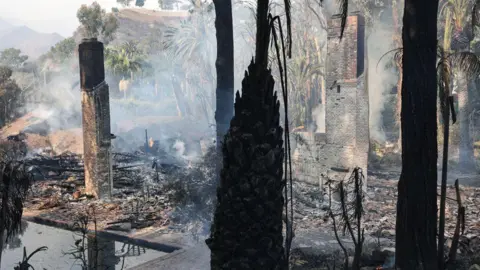Celebrities among thousands fleeing Malibu wildfire
Actor Dick Van Dyke and musician Cher are among thousands of residents who have been told to leave their homes in the city of Malibu after a fast-moving wildfire broke out and burned acres of the wealthy enclave near Los Angeles.
Hundreds of personnel have been deployed to fight the Franklin Fire, which started late on Monday in Malibu Canyon before torching several homes.
Much of Malibu is under a mandatory evacuation order. No injuries have been reported, but the blaze was still 0% contained as of Wednesday morning, and tens of thousands of homes were without power.
The cause is not yet clear, but the region has been under a red-flag warning, meaning conditions are ripe for extreme fires.
More than 3,000 acres of land have been burned, according to officials' latest information. Some 1,500 firefighters have been sent to tackle the flames.
Federal assistance has been made available, Governor Gavin Newsom said.
The blaze has left a trail of burnt-out cars and buses as well as the charred remains of homes. Seven structures were destroyed and eight damaged, authorities said.
Malibu is popular with celebrities. Homes owned by stars including Lady Gaga, Beyonce and Jay Z were reportedly among those in the evacuation zone.
Van Dyke was among the stars forced to flee, he said in a post on Facebook.
The Mary Poppins star, who turns 99 on Friday, said he and his wife Arlene safely left with their pets, except for one cat named Bobo, which remains missing.
"We're praying he'll be OK and that our community in Serra Retreat will survive these terrible fires," he wrote on Facebook.
Witnesses told KABC-TV that the home belonging to the actor's neighbour had caught fire, but that Dyke's was untouched.
Singer Cher also had to flee the fire, according to the New York Times.
Barbra Streisand is another famous resident of Malibu, however, her publicist told the New York Times it was unclear whether she has evacuated.
Star Wars actor Mark Hamill, another local, said definitively that he was staying put.
 Getty Images
Getty ImagesWildfires more generally in California have the capacity to burn through tens of thousands of acres of vegetation due to the typical dry conditions in the region.
The Franklin Fire is relatively small by comparison, though it has spread quickly.
Schools in the area have closed, roads are shut, and power has been cut locally to prevent worsening the blaze. Tens of thousands of homes were disconnected on Wednesday morning, according to tracking site Poweroutage.us.
Meanwhile, evacuation centres have been opened for residents and animals. More than 5,000 people were in the evacuation zone, according to data from the California Department of Forestry and Fire Protection (Cal Fire).
The blaze broke out near Pepperdine University. The university initially directed students to shelter in place, but has since lifted that order and said fire activity nearby had "greatly diminished".
Footage showed students sheltering in the university library as a wall of fire approached on Monday evening. Fire crews hosed down the flames. Pepperdine reported there was minor damage on campus, but no-one was hurt.
Officials have warned that this blaze has been fuelled by the seasonal Santa Ana winds.
It started about three miles (4.8km) north of the Pacific Coast Highway (PCH) - an iconic road along the Pacific Ocean known for its stunning views - and quickly spread south, jumping across the route into the Malibu Pier area.
The evacuation order covered a region that included east of Malibu Canyon Road and south of Puma Road as well as the Serra Retreat area, the County of Los Angeles Fire Department said.
A map of the blaze shows it was bordering city hall government facilities, a school and a number of homes in the area - including a line of oceanfront properties.
The latest incident comes about a month after another fire forced thousands of people to evacuate another nearby city, Moorpark.
California is a state that is prone to wildfires. The amount of burned areas in the summer in northern and central part of the state increased fivefold from 1996 to 2021 compared with the 24-year period before.
Scientists have attributed this to climate change, though not all wildfires can automatically be linked directly to this cause.
The science is complicated and human factors, including how we manage land and forests, also contribute.
However, scientists say climate change is making weather conditions that lead to wildfires, such as heat and drought, more likely.
Have you been asked to evacuate because of the fire? Get in touch.
